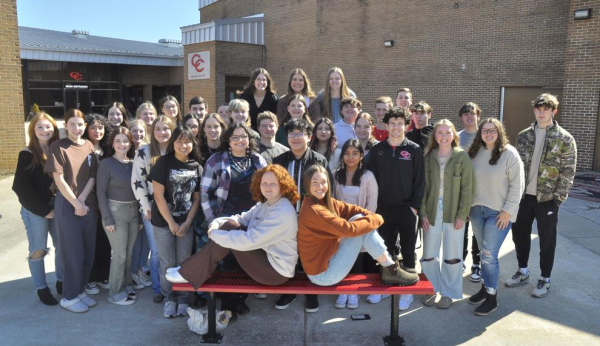Autism Awareness
May 15, 2018
Although April was autism awareness month, it is crucial for people to remain educated and aware towards autistic peers anytime of the year.
According to Autism Speaks, an organization specialized in autism awareness, advocacy and support, 1 in 62 children fall somewhere on the autism spectrum. Autism rates worldwide are also continually increasing. It is especially important now that autistic students are welcomed and understood.
Mrs. Erin Dobson and Mrs. Lisa James are special education teachers here at CCHS. Both instructors have over 15 years of experience and were able to share the insight they have gained over the years.
Mrs. James and Mrs. Dobson explained common misconceptions about their autistic students. “Not every student with autism has a ‘tick’ or something that sets them off. Not every student with autism is nonverbal or unable to succeed. They are not sick and you do not need to fear them. They do not have the ability to pick up on social cues, they need you to reach out,” explains James.
Autistic students have the same dreams and desires as any other student. Mrs. Dobson explained that many of her students are coming back to school even after they have graduated. “They want a job. They want experience and all the same opportunities that everyone else has.”, she stated.
It is important that students do not isolate or alienate autistic peers. Both educators described the benefit that reaching out and forming relationships with their students can have. Often, autistic children have various complications when building friendships. Autism affects people’s ability to pick up on social cues and understand how to develop a conversation. A study done by Autism Speaks revealed that the brain scans of people without autism would show stimulation to the mesolimbic pathway, or “reward center”, when a social cue was successfully interpreted. However, people with autism would display overactivity in the sensory interpretation area of the brain. This leads to sensory overload and often causes autistic people to feel overwhelmed or confused during some social interactions.
Being able to identify when someone with autism is overwhelmed is the most important part of being able to build a relationship. Everyone’s diagnosis is different, so signs of agitation can vary. James states, “It is important for their friends to pick up on their cues to know when they have had too much.”
Both teachers expressed their gratitude for the support they receive from faculty, staff, students, and community partners. Many of their pupils have been a part of prom groups, taken to football games, and given high-fives in the hallways. It is simple invitations like these that involve autistic students and provide them with beneficial experiences to help enhance their abilities to build relationships and interact with others.
Furthermore, the special education classes have a “Teacher Cafe” at least once a month where students prepare food for teachers to purchase. This teaches real-world skills that can only be taught through hands-on work. Without the continual support of the CCHS faculty, this experience would not be possible.
Mrs. Acklen and the special education teachers were able to give students a completely free, accessible, and comfortable prom. Outfits were provided by the school and decorations were donated by a community partner. These community partners also allow students to visit and gain workplace experience. Connections like these give students opportunities they would not find elsewhere.
Mrs. Dobson states, “We know that our kids are loved, and that is all we could ever want.”
Sources: Autism Speaks. Retrieved from www.autismspeaks.org














